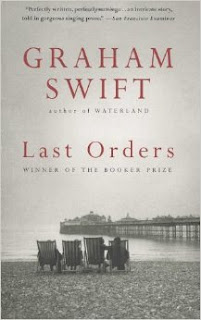Mothering
Sunday Review
Recently
I've read a novel of an author, I'm ashamed to admit, totally unknown
to me, Graham Swift. “Mothering Sunday” is a very short story,
just 149 pages, but that's enough to cause an impression I won't
forget soon!
In
a typical for Swift style, the narration jumps between 1990s and one
sunny day in March, 1924, Mothering Sunday. It's that single day that
marks the main character, Jane Fairchild and makes her move into her
future. In a seemingly simple afair between a maid and a heir we can
see disappearing Georgian society, a move from clear class society
with its rich families and their servants into modern era, where Jane
can become anyone. 22 years old in 1924 she feels her whole future
lays ahead of her and the tragedy that follows that feeling doesn't
stir her away, but towards her yet not consciously chosen path.
In
a way the novel is a novel of coming of age and not like the title
states, a romance. It's much more than just a love story. Its
fairytale-like quality is not only visible in some dreamy
descriptions, but already the first sentence suggests it: “Once
upon a time, before the boys were killed and when there were more
horses than cars, before the male servants disappeared...”. And so
it continues, including characteristic for Swift narration, with its
jumps in time and free manner of expressing narrator's thoughts.
Something that might seem rather disorganised is used as an excelent
tool to build tention and turn one simple day into a landmark in
Jane's life.
The
character could be compared to some modern-age feminist Cinderella,
who didn't need a prince to become all that she wanted. In that
interpretation Mr Niven, her patron, would become an unaware of his
importance fairy-godmother.
However
we decide to look at it, the novel with its relaxed and direct
descriptions of sex is a great read. I'm definitely going to look for
more of Swift's works.
Graham
Swift's Biography
The
text below is a compilation of 3 different sources (I haven't written
it myself, just arranged the fragments into a logical order): for the
sources check the list under the article.
Graham
Swift is one of England’s most successful and highly regarded
novelists. Since 1980 he has published ten novels, 3 collections of
short stories, and a nonfiction book. His most known books are
Waterland, from 1983, which is considered a modern classic, and Last
Orders, which was awarded a Booker Prize in 1996. He publishes
novels, since 1983 (folowing first 3 books of 1980, 1981 and 1982),
every four to five years and they are translated to 30 languages.
Graham
Colin Swift was born on May 4, 1949, in Catford in South London, the
son of a civil servant. His childhood he described as “an ordinary
suburban existence” but “really quite happy”. His family was a
typical middle class. Swift‘s mother Sheila Irene (née Bourne) had
grown up in slightly more prosperous Sydenham, while his father,
Allan Stanley Swift, hailed from the more working class; both of them
have greatly influenced him. His father had been a fighter pilot
decorated for his services. After the war, he took up a rather
mundane job in the National Debt Office, "this
Dickensian-sounding place," says Swift. "Eventually, he was
a book-keeper. He did not relish his job. But that sort of security
was very rare and he was glad to have it. He stuck with it through
his life and collected his pension."
Swift
was brought up in Croydon, in a house on the very edge of London.
"There was a farm about half a mile away and then countryside.
As I grew up, a lot of that land was developed and became general
suburbia." It was a happy childhood. "My mother was a great
bringer-up of children. My memories are of a sense of security and
comfort."
But
he also says: "Growing up in the 1950s, there was all the
physical evidence of war," Swift recalls. "Whenever we went
away on holiday we would pack stuff in five or six very sturdy brown
canvas bags called parachute bags. I didn't realise what it meant.
But my father would have put a parachute in this bag and it might
have saved his life. So the second world war, which I never went
through, has been my great history lesson." (Making An Elephant)
Though
he now bashfully dismisses it, he excelled academically and in 1960
won a scholarship to Dulwich College, the alma mater of PG Wodehouse,
Raymond Chandler and fellow Booker-winner Michael Ondaatje. Swift
found the regime restrictive: "Becoming a writer or an artist or
anything like that was not really the done thing," he says. He
also had little interest in sport and was very shy. His English
teacher, Laurie Jagger, says, "He didn't say anything unless he
had to. There was an athletics-based house system, and Graham
suffered a little under it." Jagger recalls him at 13 reading
the Elizabethan writers John Skelton and Sir Thomas Wyatt. He could
also command a range of styles: in their first lesson together,
Jagger recalls, "he wrote an exercise on the Canterbury Tales
and another based on Gulliver's Travels . It proved that Graham could
write in almost any way."
He
went to Queen‘s College, Cambridge, in 1967. He graduated in
English in 1970 and in 1973 he moved to York to write his PhD thesis
“The role of the City in 19th-century English literature". He
said about writing it "I can say unabashedly because it is now
out in the open that the whole thing was bogus. I just did enough to
convince people that I was working on something. That was really when
I was teaching myself to write" (Making An Elephant). It was at
Cambridge that Swift first saw his work in print, in the college
journal Solstice, of which he was, briefly, editor.
It
was also at York that Swift met Candice Rodd, then an English
undergraduate. Both of them came from the same part of South London
which ironicly at first didn't bring them together. "He was very
quiet and intense," she recalls, "and I was frivolous and
loud. Another thing was that we both came from the same part of south
London. I was appalled. I didn't want to meet people from south
London. And anyway, he didn't come out to play very much, because he
was ostensibly working on his thesis. He seemed a very scholarly boy
and I wasn't a very scholarly girl." They've been living
together in London for over 35 years and they have no children.
Swift
decided to abandon his PhD and worked as a teacher in Greece at the
age of 25 (a year in Volos) and returning back to London he supported
himself with a variety of stop-gap jobs, ranging from security guard
to farm worker, but mostly as a teacher, he threw himself into
becoming a writer with renewed vigour. With the success of his first
three novels he decided to become a full-time writer. In one of the
magazines, he gives fishing as his sole recreation and his agent‘s
address as his own. He is clearly a writer who values privacy in his
personal life.
His
first novel The Sweet Shop Owner was published in 1980 and received
very positive reviews. Until Waterland in 1983 he couldn't really
live off writing, but 1983 changed everything. He was a strong
nomination for a Booker Prize (which he lost to J.M. Coetzee). The
same year Graham
Swift,
with Martin Amis, Julian Barnes, William Boyd, Ian McEwan and Salman
Rushdie, was named by Granta as one of Britain's best young
novelists. "Until Waterland, I wouldn't say that I was entirely
out in the cold, but I certainly had my moments of wondering 'Am I
really going to make a career out of this?' And the events of 1983
said, 'Yes, you were right, mate!'"
Curiously
enough he is one of not many authors that even when they write about
their own city do not use their own experiences at all. He has
absolutely nothing in common with his character's and in one of the
interviews he even said that he really starts with a blank page,
“creates something from nothing”. There are NO autobiographical
elements in his books. "I have been a writer for a long time and
wanted to be a writer for a long time, even when I was quite small.
Maybe I recognized then that I had this kind of imagination. It is
more of a mystery tour than a known plan. I'm very much a writer who
writes by instinct and intuition. Things do change their shape as you
write. That is very healthy. I look back and remember when I started
out I did not know a single other writer and had no one to teach me.
It was a very solitary, long period of working away at it and
eventually getting into print. It is not something I would recommend
for anyone who wants a secure and easy life" (Goldsmith, “Book
Talk: Author Graham Swift says writing is no easy”).
His
style is very defined. He writes deeply intertextual and
metafictional novels, with self-questioning narrators who tell their
stories in non-linear manner.
If
he ever lacks inspiration he goes to the park, he has been doing the
same thing over the past 35 years: a short trip across Wandsworth
Common in south London; he leaves his Victorian terraced house, goes
past the County Arms Pub (a wood-paneled establishment where the
barmen know him by name) before ducking behind a row of houses and
then, suddenly, he is in the park. "I do my thinking while I
walk. It just loosens up the mind in the way that you don't get when
you are sitting at a desk."
Graham
doesn't go for flashy things," says his friend and fellow Booker
winner Kazuo Ishiguro. "He goes for depth of emotions and he
doesn't like to show off. He goes into that drizzly, unglamorous
region of human existence and tries to find there something
universal. I think that he looks for the dignity and heroism of very
ordinary, drab, almost-defeated lives."
However,
despite Swift's almost monastic dedication to his writing, he has
more than once been the subject of literary controversy. The first of
these conflagrations was ignited in 1986 by a little-known Australian
academic, John Frow, when he accused Swift, in Last Orders, of
plagiarising William Faulkner's As I Lay Dying, which also deals with
a group pilgrimage to lay a dead friend to rest: "The
resemblance is not just a matter of the similarity of story, which is
a common one, or of the use of shifting point of view, which again is
a standard in the modern novel, or of the representation of
vernacular speech. The resemblance goes down to small details,
including the use of first names as chapter headings, the use of a
one-sentence chapter, the attribution of one chapter to a dead
person, and the organisation of a chapter by enumerated points,"
Frow wrote. Almost immediately, the literary establishment leapt to
Swift's defence: " Last Orders does no more than what countless
books, movies, paintings and musical works have always done, and will
continue to do," wrote Ishiguro, "that is, to allude to an
established classic for its own purposes."
While
he has friends among the most prominent London literary figures,
including Ishiguro and Ian McEwan, he resists all the usual
invitations and shies away from the literary scene. In person, in his
jeans and flannel shirt, he is meticulously polite and understated.
In fact, to all outward appearances, Swift lives as eminently
unadventurous and unremarkable a life as any of his characters.
"I
think Graham is a profile-writer's nightmare," says Ishiguro,
"because he is quiet and stable. He is very much someone who is
engrossed in his writing. He's been living in more or less the same
patch of south London in that same house for years with Candice."
Ishiguro goes on: "The interesting depth to Graham is all about
his inner life."
And
so most of his time is spent at home. He wakes without an alarm
clock, slips quietly to his office without waking his wife and sets
to work. He writes with a Waterman, using black-ink cartridges on
Oxford A4 feint-ruled pads. "I like the moment the ink runs out
and you have to put another one up the spout," he says. "It's
like putting in ammunition."
The
very early morning is a time of "guaranteed non-interruption",
something he's also been assured by not having children, a decision
he puts down simply to "never having felt enough of what it is
you need to feel to have them". "He doesn't do much
research before starting the book," says his wife, Candice. "He
imagines and surmises and when he is finished he says, 'I better just
see if the place really exists or if it is possible to do this'."
"There's
no doubt that writing can on occasion be grim, lonely, miserable,
desperate and wretched," he says, "and there were many
years when I struggled materially. But I've also known wonderful
times. Writing is a very emotional thing, especially when words come
in a way that you know is right. At the heart of the writer's life
there can be a great sweetness. And it's also a great adventure: your
whole life, from book to book, is a constant adventure."
SOURCES:
1.
David Malcolm, “Understanding Graham Swift”, University if South
Carolina Press 2003
2.
John O´Mahony, “Triumph of the Common Man”, The Guardian, Sat 1
Mar 2003:
https://www.theguardian.com/books/2003/mar/01/fiction.grahamswift
3.
Edward Marriot, Interview: “How did I End Becoming a Novelist?”,
The Guardian, Sun 1 Mar 2009:
https://www.theguardian.com/books/2009/mar/01/biography-graham-swift

















¡Wow! Qué pedazo de reseña en inglés... Creo que esperaré a tu próxima entrada en español para enterarme un poquito más... ¡Pero la verdad es que este libro no lo conocía!
ResponderEliminar¡Un besito! Mo-
:) Bueno, la gran parte es biografía del autor, que es algo interesante, porque es una persona muy timida y no se sabe mucho de el ;). La siguiente entrada será en castellano ;) Un beso!
Eliminar